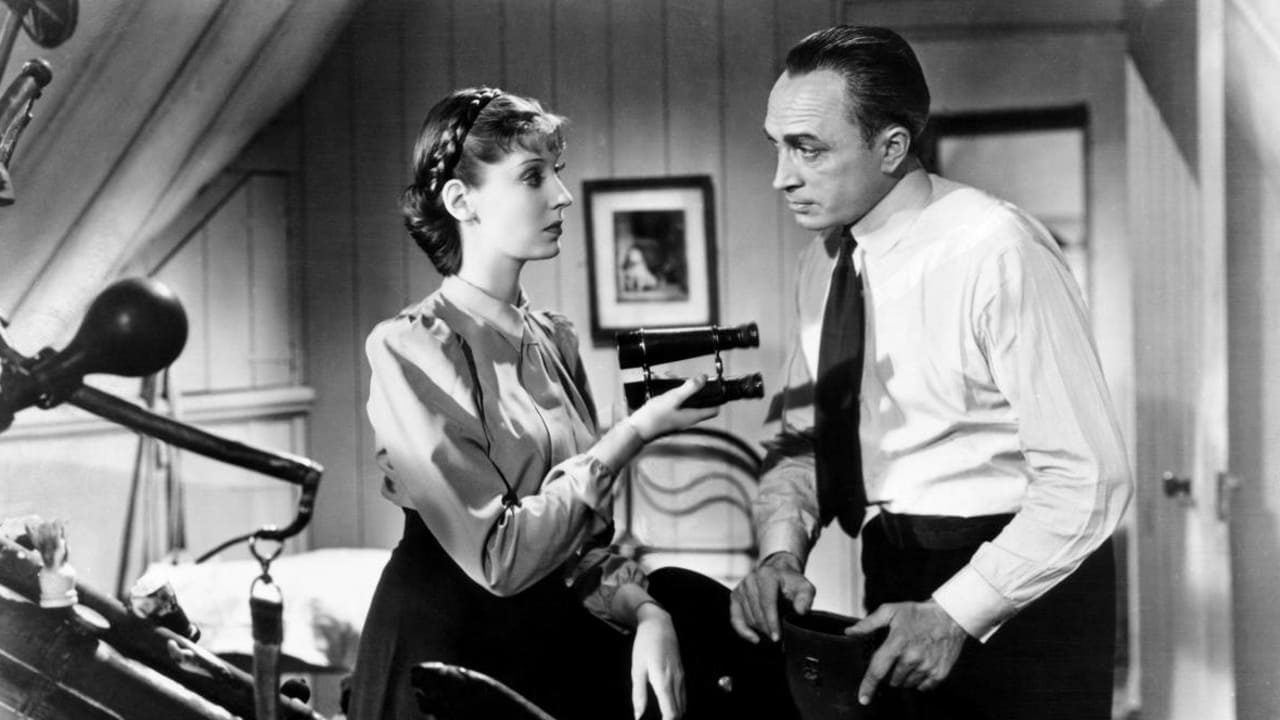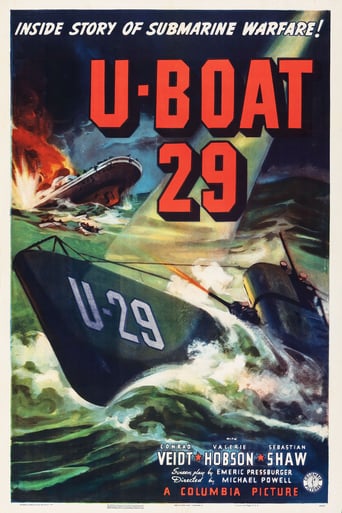

Who payed the critics
... View MorePerfectly adorable
... View MoreExpected more
... View MoreIt’s fine. It's literally the definition of a fine movie. You’ve seen it before, you know every beat and outcome before the characters even do. Only question is how much escapism you’re looking for.
... View MoreOne of the great ironies of World War I was that Kaiser Wilhelm who built this great battle fleet to rival the British Navy never got to put it to real good use. Other than the inconclusive Battle Of Jutland the surface fleet sat out the war primarily. It was those U-Boats that in this war and the next were the primary weapon of the German Navy.Which brings us to this film. A plan calling for a U-Boat or two is drafted by the German Naval Command in which U-Boat Captain Conrad Veidt is to make his way to Scapa Flow in the Orkney Islands where the British fleet is anchored. Veidt puts ashore where he makes contact with a pair of British traitors, a cashiered captain Sebastian Shaw and a newly assigned schoolteacher in the region Valerie Hobson. When the fleet sails she will give Veidt instructions how to avoid the mine fields come in and do a Pearl Harbor on the fleet.Veidt is a most honorable sort, he wears a coat over his naval uniform as he does not wish to be shot as a spy. Of course when cornered he does ditch the uniform for another garb, the better to continue his activities as The Spy In Black. All however is not as it seems and history tells us such an event did not happen in World War I.Veidt, Hobson, and Shaw really care this film with their performances. Down in the cast one that stands out is Cyril Raymond as a nosy country parson who gets too curious for his own good.This film is a rarity in that Germans are not shown as intrinsically evil. That would change on both sides of the pond shortly.
... View MoreAn unusual spy thriller in that the main characters are all German spies or collaborators. THE SPY IN BLACK is set in Orkney in 1917, where a German U-boat captain has been sent to infiltrate the locals in respect of a planned attack. He soon develops a relationship with a school teacher who's also working for the Germans, and the stage is set for the forthcoming assault on the British fleet nearby.THE SPY IN BLACK offers far more than your usual war-time thriller, and it has a very interesting plot to boot. Michael Powell handles the direction superbly, crafting a fine-looking and atmospheric little thriller on what is obviously a low budget, and the small scale somehow adds to the effect. There are plenty of twists and turns in the short running time, many of which you won't see coming, alongside a ton of drama and incident.Headlining the cast is German actor Conrad Veidt, still packing a strong presence some 20 years after his role in THE CABINET OF DR CALIGARI. The supporting performers are equally effective, especially Sebastian Shaw as the turned British officer Ashington and Valerie Hobson as the spy-turned-schoolmistress. Altogether this is a highly effective thriller and one of the best of the decade.
... View MoreIf one really wants to get a glimmer of what Conrad Veidt's career would have been like in American cinema but for the coming of World War II just as he came to Hollywood, look at his British films from 1934 to 1940. In many respects his best work was done then - he had a wider variety of roles, and was not typecast as villains as frequently as he was in the U.S. Among the films that I'd recommend watching is THE SPY IN BLACK.In World War I, Veidt is the commander of a U.Boat sent to Scottish waters. He is told that there is a British naval officer who is willing to betray the Grand Fleet at Scapa Flow. Veidt is shown interacting with his crew at the beginning, but he goes by life boat to the land, and meets his contact Valerie Hobson. She introduces him to Sebastian Shaw, the naval officer. Shaw seems to be drowning his anger in liquor, but he is prepared to give Veidt a naval document about a sortie by the Grand Fleet on a particular date, which would pass a narrow point the U-Boat would be stationed at. Veidt would then be in a position to sink several of the British dreadnoughts in what would be the worst disaster to strike the fleet since U-Boat Commander Weddigen sank the Hogue, Aboukir, and Cressy in September 1914.It's too good to be true. But gradually Veidt realizes it isn't true. He's been set up, and Shaw and Hobson are trying to capture him. And the film becomes a chase - with Veidt running amongst the islanders in the Hebrides. But his conflict is that of the gentlemanly type. He will use force, if necessary, to still reach his boat and crew and try to do some damage to his enemy's ships. But he is not by nature cruel. A telling moment in the film is late in it, when he commandeers a ferry boat. He is armed and he tells the adults that he won't hesitate to use his gun if necessary. But having said that he hears the crying of a baby that one of the woman on the ferry is carrying, and his voice softens as he says that he certainly will not war against the innocent. Veidt never said anything like that in his Hollywood films - few Nazis (as he himself would have been the first to point out from private knowledge) would have hesitated in hurting an enemy's child or baby.The film was the best that Veidt made playing an enemy officer in either world war. It ends tragically, but honorably for the man, as he decides to join his crew for the last time.
... View MoreDuring the World War, a German U-boat comes up on the coast of Scotland. At this point Captain Hardt leaves the vessel and travels to a small village to meet his contact. He plans to use the treacherous assistance of bitter Royal Navy Lieutenant Ashington to guide the Germans to the spot of the British fleet. However not all is fair in love and war and Hardt soon finds his operation at risk of compromise.Of course, much more famous for The Red Shoes and A Matter of Life and Death, this film from Powell and Pressburger should not be over looked. While it is of course propaganda (released as it was in 1939), it is not a flag waving, lets all kill the Nazi's under the bed style film. Instead it stands up in it's own right as an exciting little thriller that makes some good points about the nature of war. The plot is quite straightforward at first but has a few nice twists that I won't spoil, and is generally enjoyable.The strength of the film for me was the focus on a German Officer and not having him as a stereotypical evil tyrant. While the film doesn't let us wonder who the good guys and the bad guys are, it does at least allow Hardt to be more of a full person and the film better as a result. The ironies of the final action of the film is clear and is even more of a striking comment on war when you look at the `blue on blue' stats for Gulf War 2. Veidt does well in the lead as Hardt and is partly responsible for keeping him a bad guy without over egging the cake. Shaw and Hobson are good but perhaps a little too much of the `Heroic Brits' about them.Overall this is a good wartime thriller but the unusual tack that it comes at, plus a darker and slightly subversive tone about it helps it stand out, if not from the rest of P&P's work, then certainly from the vast majority of wartime propaganda thrillers made in Britain around the second world war.
... View More